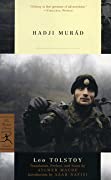 I read Hadji Murad because it was referenced in the last pages of Leila Aboulela’s excellent The Kindness of Enemies and is set in the same location as the historical part of her book, 1850’s Caucasus. Aboulela’s book centres on the kidnap of A Russian Princess and her time in captivity under the protection of the Highlander Shamil Imam. He wishes to trade her for his son, help captive by the Russians for more than ten years.
I read Hadji Murad because it was referenced in the last pages of Leila Aboulela’s excellent The Kindness of Enemies and is set in the same location as the historical part of her book, 1850’s Caucasus. Aboulela’s book centres on the kidnap of A Russian Princess and her time in captivity under the protection of the Highlander Shamil Imam. He wishes to trade her for his son, help captive by the Russians for more than ten years.
Tolstoy was in the Russian army for a time and clearly witnessed many missions. One of the events he had knowledge of and wrote about, though this novella was published post-humously by his wife, was the defection to Russia and subsequent killing of one of Shamil Khan’s chieftans, another Highlander, Hadji Murad.
Though I’m not a huge fan of the classics, there are some exceptions and I did enjoy Anna Karenina, however having read Aboulela’s version which really brings the characters alive and highlights their dilemmas so openly, I found it hard to connect with Tolstoy’s tale, which rarely touches on lives other than the soldiers and noble decision makers.

Photo by nastia on Pexels.com
The opening scene though is brilliant, the ploughed field, bereft of life, everything turned over, leaves only one sturdy thistle, half destroyed but for that one stalk still standing tall, the flower head emitting its bold crimson colour.
The land was well tilled and nowhere was there a blade of grass or any kind of plant to be seen; it was all black. “Ah, what a destructive creature is man… How many different plant lives he destroys to support his own experience!” thought I, involuntarily looking round for some living thing in this lifeless black field.
It is the scene that brings back the memory of this man Hadji Murad and compels him to write out those pages, perhaps purging himself of a ghastly memory.
“What energy!” I thought. “Man has conquered everything, and destroyed millions of plants, yet this one won’t submit.” And I remembered a Caucasian episode of years ago, which I had partly seen myself, partly heard of from eye-witnesses, and in part imagined.
It does make me think that he had intended not to publish it, that perhaps it was written for another purpose altogether. Particularly as, at the time he wrote it (1896-1903)
he was spending most of his time writing his virulent tracts against the art of fiction and denouncing some of the best writers in the world, including Shakespeare.
In conclusion, it highlights to me the importance of reading various perspectives of history, not just one side or the other, but also across gender. It is refreshing to read a female historian’s fictional version of an age old conflict, inhabiting characters who observe from positions of lesser power, of oppression, for their powers of observation are that much stronger than the privileged, it being one of their necessary survival instincts.

I’ve generally struggled with Russian novelist, though I’m aware that it’s the translation that provides a barrier in many instances. ‘Clunky’ comes to mind. With a such a long TBR list before me, I suspect this may not make the cut, despite the excellent reasons you provide for giving it a go.
LikeLiked by 1 person
I read it out of curiosity, but it’s not one I’d recommend.
LikeLiked by 1 person
That’s good enough for me! I came back from my library duty today with 11 books, some of them your recommendations …
LikeLiked by 1 person
I tried reading this in My Year of Russian Reading, and I couldn’t get on with it. Full marks to you for persisting!
LikeLiked by 1 person
It wasn’t that long, otherwise I probably wouldn’t have gone for it, the essay in the beginning was interesting and in the context of reading The Kindness of Enemies, it confirmed to me what I suspected.
LikeLike
I think it gets more air than it deserves because of the contemporary interest in that religion. If not for that, it would probably lurk in a dusty cupboard where it belongs!
Tolstoy was much much better at long expansive novels, which just goes to show that short stories are, like they say, much harder to write well than long ones.
LikeLiked by 1 person
I’m always a bit wary of posthumous works that the writer might not have intended to be published at all, so I wouldn’t be in a rush to read this, but the opening scene does sound wonderful.
LikeLiked by 1 person
Yes, I read it really for comparative purposes, sadly the rest isn’t at all like that opening scene.
LikeLiked by 1 person